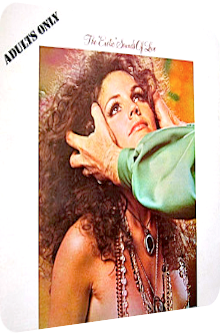
101 Strings
Exotic Sounds Of Love
1972
When an album such as The Exotic Sounds Of Love by the 101 Strings features both a huge label on the front artwork with the warning “Adults Only” and implies hardened hands who seem to almost strangle a likeable woman, chances are that these are two of the many marketing tricks solely used to make this work much more interesting for the very group that is by the very means of this two-word disclaimer expelled from enjoying this sexy artifact. And indeed, there is a good reason for this pre-“Parental Guidance” seal. But first things first: The Exotic Sounds Of Love is released in 1972 on Al Sherman’s Burbank, California-based Alshire Records.
Having bought the rights to the 101 Strings which are more of a label for ever-changing international orchestras than one local collective, Sherman continues the guerilla tactics of inventor and previous owner David L. Miller and places the 101 Strings in a huge amount of genres, so that they are ever-present not only for the connoisseur, but the desultory listener who might then spot the LP’s in a shop, gas station or even a travel agency. The story behind The Exotic Sounds Of Love is quickly told and is based on Jane Birkin’s and Serge Gainsbourg’s 1969 smash hit and cultural shocker Je t’aime in which Birkin whispers and moans her way to the hearts and other bodily parts of millions of men. Almost three years later, the 101 Strings try to jump on the erotic caravan of love. While there are perfectly exotic – read: Oriental – and warm-hearted spacier tunes by writers such as Monty Kelly, Al Sherman and even Les Baxter on board, the dubious signature element of this LP is a mysterious lady named Bebe Bardon. In four tracks out of 12, she cannot help herself but moan and whisper wordless wisdoms and suggestive-scabrous epigrams. Yikes! Read on to find out more about my desperate-humorous take on her appearance as well as for a huge shocker that comes in the shape of one of Les Baxter’s compositions. Shudder!
The opener is basically the most audacious tune to ever grace the Exotica genre. Even if one considers Chaino’s savage lust, the primitive grunts and moaning women on albums such as Jungle Echoes (1959), there is much room left to exaggerate even this primeval gibberish. Enter the 101 Strings and I Remember, a lovestoned cocktail brewed by longtime collaborator Monty Kelly. The instrumentation is perfectly silky and soothing, launching with a Pagan alto flute and ethereal Space-Age strings par excellence. What does not work so well is Bebe Bardon’s monolog who melts away by recapitulating last night's secrets (“how gently you kissed me” etc.). So far, so schmaltzy. But while she mentions her whole curriculum libidae in front of the ashamed listener, she moans and susurrates ad infinitum. Jane Birkin’s French mélange was an affront. This is a well-calculated addendum no one ever asked for. Avoid.
As stupendously stupid the opener is, the follow-up Karma Sitar is one of the greatest efforts by the 101 Strings ever! Envisioned by Monty Kelly for the symphonic ensemble, the prominent use of a real sitar in front of a bongo-accentuated spy theme murkiness boosts the Oriental mood. Its alkaline shadiness and elasticized afterglow is superb and enormously exotic. Glistening glockenspiels, shawm-like flutes and moist marimbaphones round off the scenery that is much tastier than a Jaffa cake.
I do not know why a track like Whiplash has to appear on an album like The Exotic Sounds Of Love – okay, I do, I do! – but rest assured that this eclectic uptempo critter by Daniel L. Miller and Al Sherman resides in-between the peculiar particularities of Crime Jazz due to its dark electric guitar, symphonic Space-Age extravaganza and elevating tone sequences in major. Sizzling hi-hats, gorgeously frantic flute flumes and euphonious brass layers round off the grandiloquence. Alas, Miss Bardon moans along to the incisive sound of a whiplash, but no can do. The following Don’t Leave Me Like This opens the stylistic range further by placing the already known sitar-like guitar right in the middle of car horn-resembling electric organs, a rural harmonica chintziness and a bouncing beat structure that resembles the recording technique of the 101 Strings’ bestseller Astro-Sounds From Beyond The Year 2000 (1969). The mood is gleeful and funky, much more akin to a slower Boogie Woogie than a Blues. Watch out for the galactic organ solo near the end!
While Monty Kelly’s Maybe It’s Love returns to more smoothened and silkier sceneries and aurally depicts a hammock-compatible sunset at a lover’s beach via glowingly smarmy strings, insouciant guitar chords and contrapuntal harpsichord shards, Kelly’s Love On The Beach continues this exact scenery but augments the string washes, adds female wordless backing vocals to the arrangement and is much more keen on a vibraphone- and marimba-accompanied Hapa Haole setting. Naturally, there must be a steel guitar on board, and its semi-cosmic physiognomy works wonders in tandem with the rainbow backdrop. A tad too cheesy and melodramatic, Love On The Beach at least opens the endemic circumstances yet another time.
Side B takes over the intrinsic qualities of side A with all the good and bad things that come with it. Al Sherman’s and David L. Miller’s Instant Nirvana may have a great title and comprise of a majestic-crepuscular duality of seven-tone brass fanfares, but since Bebe Bardon moans her way through the vast majority of this guitar-heavy, classic drum kit-backed golden shimmering psychedelia, one can as well trash it altogether, I’m afraid. The following Love Theme, however, is undoubtedly the very best elysian anthem of the whole LP! Gigantic mauve-tinted string washes become enmeshed with a superstructure of wraithlike mixed choirs and harp cascades. It is one of the fluffiest, fuzziest cottony anthems ever. Love Theme: a celestial cloud seven. The lyrics range from interplanetary routes to the powerful virtue of love, yes yes, we’ve heard this before, but the lilac fluxion, the phantasmagoric riverbed of these sound waves is really gorgeous, fully fleshed out and densely layered. A wonderful counterpart to the funky sleaziness and glossy ornaments.
On A Warm Night finally introduces a tune that is written by Les Baxter. One notices the Baxter factor in the form of a wide array of textures and catchy melodies: pristine flutes and their alto foils, swirling harps, gaseous piano notes, strings aquiver with pleasant anticipation and a surprisingly balanced and lacunar structure allows each ingredient to shine, even though the tune is doleful and mysterious most of the time, but explodes in a cavalcade of intertwined strings which remind of the luminary’s cosmic coils of Caribbean Moonlight (1956). Up next is another recycled Baxter gem called Bésame Mas (Kiss Me More) that is taken from his album Que Mango! (1970) which he recorded with the 101 Strings. The track appeared under the name of Boca Chica and is one of his woman-poeticizing pieces supercharged with benign string coppices, tremendously catchy and uplifting melodies and Brazilian percussion. It is one of Baxter’s best compositions ever, but is horribly burned here: Bebe Bardon moans over the recording! This can’t be happening! The situation is so bizarre that one might as well laugh about it.
When the first punchy sitar twangs of Monty Kelly’s Exotic Love appear, everything is forgiven. Staccato violins and shady tones grab the listening subject, unleash Middle Eastern and pentatonic timbres, let dramatic strings free and present a gallimaufry of excitement. A great over-the-top performance akin to Karma Sitar on side A. The closer is delivered by Les Baxter and again taken from the LP Que Mango!: Felicia My Love unites transcendental strings with pointillistic glockenspiels, mellow horn helixes, sizzling maracas and an abundance of euphoric tones that are so typical for those rose-tinted besotted dedications of love.
Despite the few missteps and highly unnecessary “vocal performances” by Bebe Bardon whose real name shall remain a mystery forever, The Exotic Sounds Of Love is a killer collection of material by the 101 Strings, the vast majority of it designedly written with this album in mind. Of all the other love-related albums out there, this one is cleverly schizophrenic in that producer Jack Dorsey tries to mediate between both signal terms that grace the album title, namely exotic and love. The latter is naturally envisioned via string protuberances and breezes par excellence, while the former is strangely narrowed down to a Middle Eastern flavor only. Notwithstanding these implications, there are albums by the 101 Strings that are much cornier and more syrup-coated than this one. The electrifying Crime Jazz brutes Karma Sitar and Exotic Love are unexpectedly energetic, uplifting and among the best tunes of the collective’s – or brand’s – huge catalog. Here the enchanting complexion of love comes in the shapes of sand dunes, adventurous mayhems and all too close encounters with the bad guys of your choice.
The strongest contrast and best love-related presentation happens in the simple-titled Love Theme where all strings of the world are gathered to fuel the solemnity of the mixed choir; the magenta aura illumines the bolstered bliss, the vibrance and density is par excellence and never repeated on the album. This tune is one of a kind, and even though more than just a few listeners will rightfully ridicule its melodramatic mellifluousness, the textures of the arrangement and the purposely blurred emanation of its innermost core are astonishingly well done. If you do not mind the occasional appearance of Miss Bardon who is present one too many times if you ask me, you can, at the time of writing this review, experience the full scope of the LP in vinyl form only. Some of its tracks appear on digital compilations of all kinds, but as far as I know, the album has not yet been made available as a download version. This time, I know who to blame for this bemoaning fact.
Exotica Review 259: 101 Strings – The Exotic Sounds Of Love (1972). Originally published on Sep. 7, 2013 at AmbientExotica.com.
